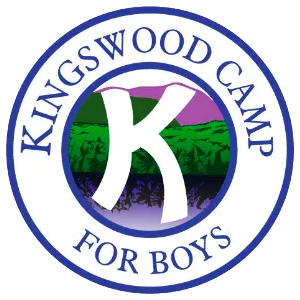“The defining Kingswood difference is the camp’s commitment and attention to the development of campers at every age. Kingswood is an emotionally healthy field on which young boys play- and learn from one another and from their counselors how to become kind and strong young men.” – 2015 Parent Survey
“I am so impressed by the Kingswood staff; their level of enthusiasm for camp is amazing. There’s not a better place for a boy to spend the summer.” – 2015 Parent Survey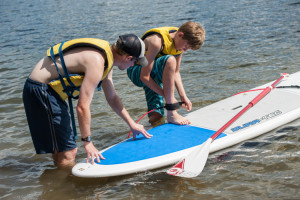
Parents often ask about our ability to maintain an inclusive, happy community. The answer boils down to a central line from the staff manual: “The staff is everything”. Being a counselor who really makes a difference is no easy task. The essential qualification for anyone working with children is that he or she enjoy being around them. Beyond this general fondness for kids, a camp counselor should have faith in the inherent goodness of all children, be flexible in planning activities, have tolerance for their sometimes misguided behavior, and exhibit patience at all times. Being a camp counselor requires maintaining a crucial balance between being a friend and being a temporary parental figure. This takes maturity. Camp counseling is tiring work and requires significant stores of energy. Counselors need to bring their “A game” to all waking hours of the day, to remain in tune with the needs of the boys. So, how do we get over 80% of counselors to return year after year? Hint: it’s not the paycheck.
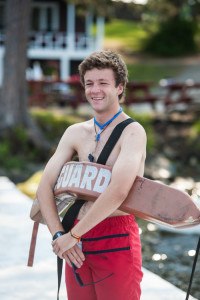 At Kingswood, we strive to develop engaged counselors who bring an authentic excitement to the activities they lead and assist. Accordingly, one of our goals is to create an atmosphere where staff feel appreciated and important. Our counselors have the opportunity to experience much of the same variety of schedules and activities as the campers. Camp administrators work closely with staff to create their weekly schedules. We promote a staff “growth mindset” and counselors often request to be trained to lead more than one activity. This process includes a course of study materials (complete with a written test) of all pertinent safety rules and procedures, a period of “apprenticeship” with an activity head, a test of practical knowledge and ability in the field, and a final series of observations by an administrator. We appreciate the pride counselors exhibit as their skills improve.
At Kingswood, we strive to develop engaged counselors who bring an authentic excitement to the activities they lead and assist. Accordingly, one of our goals is to create an atmosphere where staff feel appreciated and important. Our counselors have the opportunity to experience much of the same variety of schedules and activities as the campers. Camp administrators work closely with staff to create their weekly schedules. We promote a staff “growth mindset” and counselors often request to be trained to lead more than one activity. This process includes a course of study materials (complete with a written test) of all pertinent safety rules and procedures, a period of “apprenticeship” with an activity head, a test of practical knowledge and ability in the field, and a final series of observations by an administrator. We appreciate the pride counselors exhibit as their skills improve.
Orientation Week starts as early as ten days before the campers arrive. We fill almost every minute of that time with hands-on experiences. Staff have an opportunity for many kinds of training. They become certified lifeguards, lead clinics, and take boat and van driving clinics. We even take an afternoon to hike Mt Piermont together; it is a terrific bonding experience and trips protocol is reviewed “in real time”.
Orientation Week is filled with meetings (but not the boring kind!). Directors and administrators share insights and run sessions on topics such as “cabin life,” “professionalism,” “sportsmanship,” “homesickness” and “master-clinician techniques.” We have over a dozen administrators with years of classroom experience to lead small breakout sessions. We relish observing the counselors absorb the intangibles employed by a great teacher to make a lesson fun, engaging, and enriching. Tone, management, pacing, diversity of approach, review, and practice are all demonstrated and discussed. When Todd Sabiston demonstrates how he engages boys from the very first moment of his fishing clinic, the lesson resonates among staff participants and observers.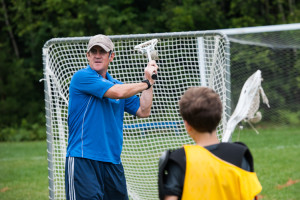
Before Orientation Week commences, each young counselor has an administrator or veteran staff member assigned as his or her mentor, and they meet on a regular basis throughout the camp season. With this assistance, the counselor monitors a list of personal goals for the summer. The staff find it extremely supportive to have direct guidance from their more experienced peers. Finally, the mentoring program keeps our administrators keenly aware of all of the dynamics at every level in our tight-knit camp community.
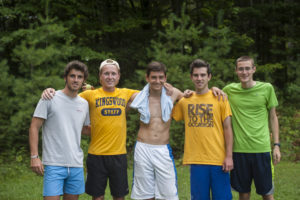 All camps speak a unique dialect of history, people, games, characters, and inside jokes that exist nowhere else. Both experienced and well-trained counselors maintain this language and most relish the task. The biggest secret to staff happiness is that if it is “done right,” being a counselor can be even more fun than being a camper. The best counselors realize that the trick is to see camp as much more than the sum of what he or she alone can get out of it. An outstanding camp counselor knows how to have a blast, while including the kids in that wholesome fun.
All camps speak a unique dialect of history, people, games, characters, and inside jokes that exist nowhere else. Both experienced and well-trained counselors maintain this language and most relish the task. The biggest secret to staff happiness is that if it is “done right,” being a counselor can be even more fun than being a camper. The best counselors realize that the trick is to see camp as much more than the sum of what he or she alone can get out of it. An outstanding camp counselor knows how to have a blast, while including the kids in that wholesome fun.
